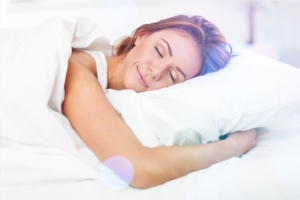How Does Sleep Affect My Immune System?
We all know sleep is important, but did you know strong immune support requires sleep to function properly? Getting enough quality sleep promotes a strong and balanced immune defense, while serious sleeping issues impair the immune system’s ability to function properly.
Innate vs Adaptive Immunity
The relationship between the immune system and sleep is interesting in that it is bidirectional: weak immune response can affect sleep and not getting sleep can affect immune response. They go hand in hand.
Studies show sleep is important for the immune system’s robustness both short and long-term. People who don’t get enough sleep are more likely to have a weakened immune system. In fact, sleep supports both innate and adaptive immunity.
Simply put, innate immunity refers to the first line of defense that recognizes threats to the immune system.
Adaptive, or acquired immunity, refers to the process that occurs when an antigen enters the body, and the immune system then alerts the rest of your body how to attack.
 Your Immune System at Night
Your Immune System at Night
Certain immune processes appear to only be activated during nighttime sleep. For example, proteins that send messages for the immune system called cytokines are released. Some of these cytokines have been shown to promote sleep and are needed when the immune system is attacked and when the body experiences inflammation.
Alerting this inflammatory response is key to the body’s recovery, as this inflammatory response may aid in the healing process, reinforcing innate and adaptive immunity while the body attempts to restore itself.
Even when the body is well, though, studies suggest that this inflammatory response performed during nighttime plays a role in strengthening adaptive immunity. Thus, sleep helps to strengthen and bolster the immune system for current needs, as well as in preparation for your body’s future needs.
Sleep also appears to promote immunological memory, the immune system’s ability to recognize an antigen and respond accordingly, and reinforces this response.
Experts aren’t sure why this happens while you’re sleeping, but numerous elements are thought to be at play:
- Breathing and muscular activity slow down during sleep, freeing up resources for the immune system to accomplish these vital functions.
- Because the inflammation that occurs during sleep could affect physical and mental performance if present during waking hours, the body has evolved to allow these processes to take place at night.
- Melatonin, a sleep-promoting hormone released at night, is capable of reducing the stress caused by inflammation while sleeping.
While scientists are not completely certain of all the intricacies of the immune system, we do know one thing: Sleep is essential to a high-functioning immune system.
If you are looking to support your immune system, consider combining quality sleep with Resteva Sleep formula by Results RNA. Achieve a balanced and strengthened immune system.
References:
https://www.sleepfoundation.org/physical-health/how-sleep-affects-immunityhttps://www.mayoclinic.org/diseases-conditions/insomnia/expert-answers/lack-of-sleep/faq-20057757#:~:text=Yes%2C%20lack%20of%20sleep%20can,if%20you%20do%20get%20sick.



